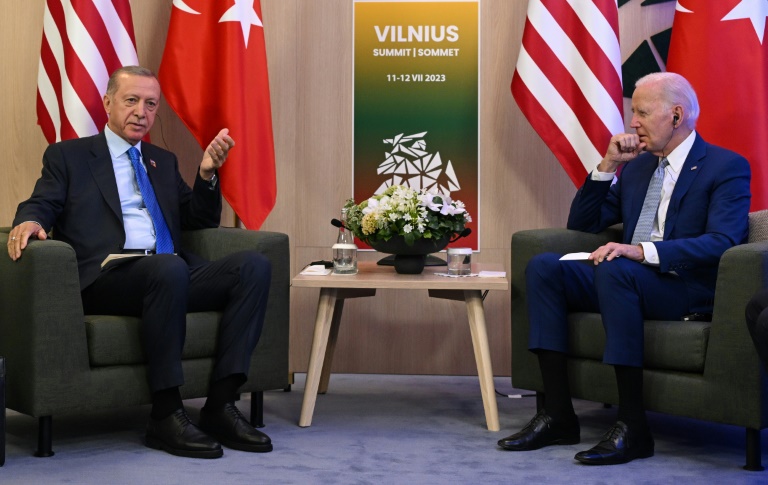Turkey’s Erdogan braces for tete-a-tete with Biden in May

Turkish President Recep Tayyip Erdogan will meet with US counterpart Joe Biden at the White House on May 9
Istanbul – Turkish President Recep Tayyip Erdogan will meet with US counterpart Joe Biden at the White House on May 9, a Turkish official told AFP on Friday.
It would be the first White House meeting between the two leaders, who last met on the margins of the NATO summit in Lithuania in July.
The visit comes as two NATO allies are seeking to rebuild ties strained over a spate of disputes including Ankara’s delayed approval of Sweden’s accession to the US-led alliance.
“I think this is quite a significant trip. Erdogan has now been in charge of running Turkey for 21 years and Biden is the first president until this moment to not have invited him to the White House,” Soner Cagaptay, director of the Turkish Program at The Washington Institute, told AFP.
“It’s a pretty big deal that Erdogan has finally secured an invitation just before the end of Biden’s term,” he said.
Turkey’s resistance to Sweden’s NATO bid after Russia’s war on Ukraine in 2022 was one of the sticking issues in ties, a move that also reflected Erdogan’s more nuanced stance toward Russia.
Turkey has profited from maintaining trade with Moscow while at the same time supplying Ukraine with drones and other essential arms.
Erdogan has also been one of the few Western leaders to hold regular meetings and phone conversations with Russian President Vladimir Putin, who was initially expected to visit Turkey in February.
Ankara refused to join the West in imposing sanctions on Russia as concerns were raised over Turkey becoming a transit route for goods supporting Moscow’s wartime defence industry.
“We have no intention to harm legitimate trade between Turkey and Russia but we are very serious when it comes to illegal trade,” a Western diplomat told AFP.
-‘Played well’-
The Biden administration in January approved $23 billion in F-16 warplanes for Turkey swiftly after it ratified Sweden’s stalled NATO membership bid.
Turkey will get 40 new F-16s and upgrades to 79 of the jets in its existing fleet.
Washington did not green light the transaction until Turkey’s instruments of ratification of Sweden’s membership had arrived in Washington, a US official said back then, highlighting the highly sensitive nature of the negotiations.
“Turkey played its hand quite well over the F-16s and deal with Sweden and leveraged its position in the alliance,” Cagaptay said.
Turkey’s ageing air force would benefit from new F-16s, as it has suffered from Ankara’s expulsion from the US-led F-35 joint strike fighter programme in 2019 over Erdogan’s decision to acquire an advanced Russian missile defence system.
Erdogan has turned into one of the Muslim world’s harshest critics of Israel’s devastating response to the unprecedented October 7 attack on Israel by Hamas.
He is angry at Washington for its support of how Israel is pursuing its war against Hamas in the Gaza Strip.
The Turkish leader has compared Israeli Prime Minister Benjamin Netanyahu to Adolf Hitler and accused the United States of sponsoring the “genocide” of Palestinians.
He has also rebuffed US pressure to cut off the suspected flow of funding to Hamas through Turkey, and defended the group as legitimately elected “liberators” fighting for their land.
Erdogan met with Biden predecessor Donald Trump in the Oval Office at the White House in 2019.
In 2017, his trip to Washington was marred by scuffles between protesters against the Turkish leader’s government and members of Erdogan’s security detail.
That attack occurred shortly after Erdogan’s first official meeting with Trump at the White House.
Turkey’s spy agency chief Ibrahim Kalin is due to meet with members of the US House of Representatives in the capital Ankara on Friday.
Local media reported that they were due to discuss Erdogan’s coming visit, the fight against Islamic State jihadists after the deadly Moscow attack, as well as the wars in Ukraine and Gaza.
